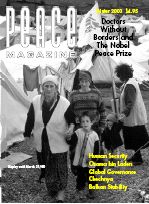
Peace Magazine Winter 2000, page 31. Some rights reserved.
Search for other articles by PMag staff here
In 1995, a new law obliging Russian NGOs to reapply for official registration by this year was adopted. The Glas-nost Foundation was one of the first to be refused re-registration. The Moscow Bu-reau of Justice stated, “We won’t provide human rights organizations with registration. Human rights advocacy, according to the Russian Constitution, is the obligation of the State.... none of NGOs has a right to interfere into state governance.”
The finding against our foundation was reversed by the Presnenskiy Inter-Municipal Court in May. Moscow City Court plans to review the case again. Both the Minister of Justice and the U.N. High Commis-sioner on Human Rights have attempted to set the question as a priority with the Russian prime minister. There have been no developments.
Russian authorities are trying to destroy two-thirds of the country’s NGOs with this demagogical pretext: the abolition of “dead, existing- on-paper organizations.” Only neo-fascist organizations are being registered without any constraints or delays, including organizations like “Russian National Unity,” the National Bol-shevik Party and the Russian Party, which has always expressed anti-Semitic views.
The legislation will force many NGOs underground, as they had been 20 years ago. It is difficult to say to what degree this legislation is connected with the third appointment of the former Federal Security Chief as prime minister.
www.hungersite.com
Now you can feed the world every time you log on to the web. An innovative private citizen has designed a website where surfers can donate one quarter cup of food per day just by clicking on the Donate Free Food icon. The donations are funded by the site’s sponsor companies who pay half a cent per hit received on the day or days they chose to sponsor. The cash goes to the U. N.’s World Food Programme which distributes the equivalent food donations to 80 countries worldwide. In November, more than 1.6 million pounds of food were distributed. Since its launch in June 1999, the website has generated over half a million donations from Canada alone. When 24,000 people die each day in the world from hunger or malnutrition, one click a day can go a long way. Peace Magazine invites all its readers to visit the website.
Internet service providers across Russia are required by law to install a program that reads their clients’ private emails. Called SORM-2, Sy-stem for Operational-Invest-igative Activities in English, the program allows the Federal Security Service (FSB), the KGB successor agency, to monitor all e-communication and commerce at the FSB headquarters in real time. At costs as high as $30,000, installing and running SORM-2 can shut down some of the smaller servers. But, servers refusing to install the system can have their operating licenses revoked by the state. Only one server has so far refused to cooperate. The FSB says SORM-2 is an effective law enforcement tool, monitoring such criminals as tax evaders and pedophiles. They cite that even the U.S. National Security Agency has a similar program, called Echelon. Hu-man rights groups, however, believe that the FSB cannot be trusted with the kind of power that SORM-2 offers.
The European Parliament and more than 60 NGOs again put forward the idea of a European Civil Peace Corp at a conference on December 9. This time, representatives from both the E.U. Com-mission and the European Council attended, and clearly expressed their interest in developing an effective institutional body to improve civilian intervention in armed conflicts. A panel of speakers, from groups such as Peace Brigades International, Women in Black, European Centre for Common Ground, and the Italian volunteer White Helmets from Asso-ciazione Papa Giovanni XXIII, presented their experiences with non-violent techniques of conflict resolution.
In a December 17 press release, Canada’s Department of Foreign Affairs and International Trade confirmed that Canada and the United States have agreed to extend the agreement on shared use of the Canadian Forces Maritime Experi-mental and Test Ranges (CFMETR) at Nanoose Bay for another 10 years. The lease includes a new clause stating both governments will adopt protocols ensuring “responsible environmental stewardship,” meaning all tests of unarmed weapons and acoustic sensors at Nan-oose will be environmentally safe.

Peace Magazine Winter 2000, page 31. Some rights reserved.
Search for other articles by PMag staff here